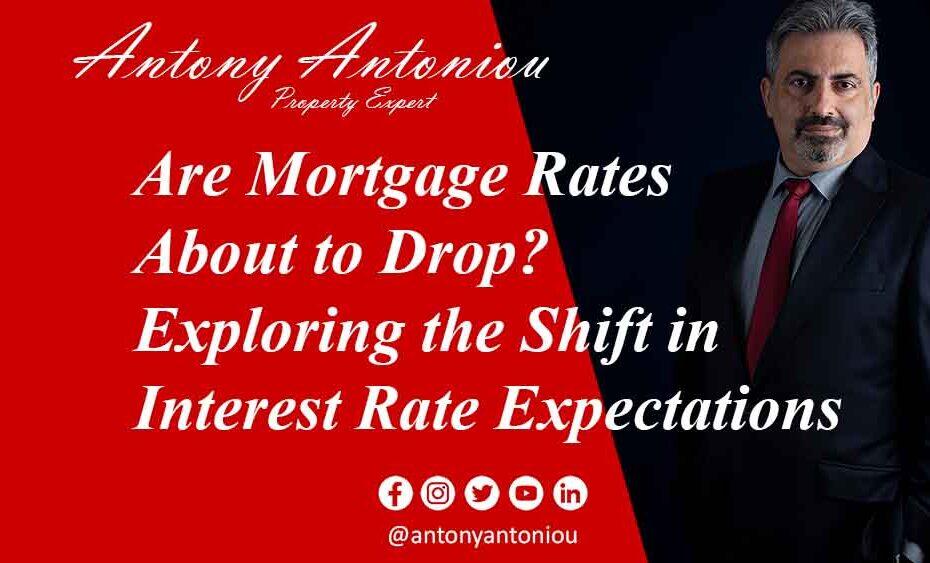Are Mortgage Rates About to Drop? Exploring the Shift in Interest Rate Expectations
**Introduction**
If you’re considering refinancing your mortgage or diving into the housing market with a new home purchase, you might want to exercise a little patience. The financial landscape is abuzz with whispers of potential decreases in mortgage rates. This may seem counterintuitive given the current economic climate, but there are compelling reasons behind this speculation. In this post, we’ll delve into the factors that could be contributing to this shift and what it might mean for prospective homebuyers.
**The Changing Tide of Inflation and Interest Rates**
Inflation, that often elusive economic factor, has played a pivotal role in shaping the recent murmurs about mortgage rates. Historically, inflation has been a harbinger of rising interest rates. However, the tide appears to be turning, and this is where the optimism about lower mortgage rates begins to make sense.
In the past few months, inflation rates have been on a downward trajectory. This downward movement can be attributed to various factors, including changes in energy prices, decreases in the cost of raw materials like timber and steel, and an overall improvement in economic supply chains. These factors, often referred to as “base effects,” have caused inflation to retreat from its previous highs.
**The Influence of Market Sentiment**
The financial world is driven by market sentiment, and this sentiment has a direct impact on interest rate expectations. If market participants anticipate higher inflation, they usually expect central banks to counteract it by raising interest rates. Conversely, when inflation concerns ease, the expectation of interest rate hikes diminishes.
Consider the case of the Bank of England. Just a short while ago, the money markets were projecting an interest rate peak of 5.75%. This was a marked decrease from the earlier projection of 6.75%. The rationale behind this shift was the reduction in inflation rates, from 8.7% in May to 7.9% in June. This trend suggests a growing belief that interest rates might not spike as dramatically as once thought.
**The Mortgage Industry’s Response**
The interconnectedness of financial markets means that changes in interest rate expectations have a ripple effect. Mortgage companies base their rates on these expectations, meaning that when market sentiment leans toward lower interest rates, mortgage rates tend to follow suit.
Currently, the average two-year fixed mortgage rate stands at 6.84%, notably higher than the Bank of England’s base rate of 5.25%. However, some noteworthy players in the mortgage market are making moves that signal anticipation of lower rates. Both Nationwide and TSB have recently announced a substantial 0.55% cut to their standard variable rates. This seemingly bold move is underpinned by their belief that interest rates could be on a downward trajectory over the next two years, even in the face of potential short-term rate hikes.
**Navigating the Future: Anticipating More Changes**
While economic predictions can never be entirely certain, the shifting landscape of interest rates does offer some intriguing possibilities for both prospective and current homeowners. It’s important to note that central banks, like the Bank of England, often communicate with a delicate balance, catering to various audiences and economic indicators. They are cautious about making explicit statements that could lead to drastic market reactions.
Despite this uncertainty, signs point to a potential drop in mortgage rates over the next couple of years. Even if there’s a final push in interest rates, the prevailing sentiment suggests that the trajectory points downward. This could lead to enhanced competition among mortgage providers and ultimately translate to better terms and opportunities for consumers.
**Conclusion**
The realm of mortgage rates is evolving, guided by a nuanced interplay of inflation, market sentiment, and central bank strategies. As a prospective homebuyer or someone considering refinancing, keeping an eye on these shifting dynamics could pay off in the long run. While economic forecasting remains an intricate art, the trend toward potentially lower mortgage rates offers a glimmer of hope for those seeking a more affordable path to homeownership. Stay informed, exercise patience, and remain agile in your financial decisions as the future of mortgage rates takes shape.
**In my opinion**
I dare to tentatively foresee light at the end of the tunnel, subject to no more unforeseen events of course. Therefore, it would be wise to hold your nerve for a little longer, as we will probably see another 0.25% rise next time, but it may very well be the last, what this means for you, is that lenders will begin to offer deals based on a peak of 5.5% with the expectation that the rates will fall, during the life of the mortgage and therefore, there is every possibility that there will be some increasingly competitive fixed-rates available in the next few months.
As always, this is only my opinion and information about the market, you must always get professional advice.

